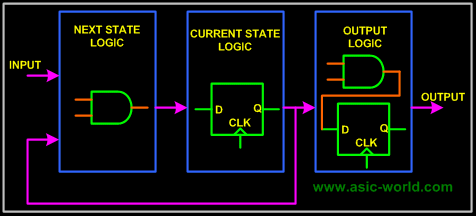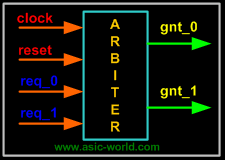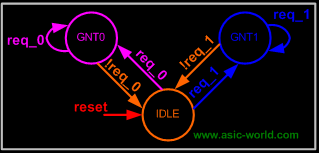|
|
| |
|

|
|
|
|
| |
|

|
| |
 |
Introduction
|
|
|
Basically a FSM consists of combinational, sequential and output logic. Combinational logic is used to decide the next state of the FSM, sequential logic is used to store the current state of the FSM. The output logic is a mixture of both combo and seq logic as shown in the figure below. |
| |
|

|
|
|
 |
| |
|

|
|
|
Types of State Machines |
|
|
There are many ways to code these state machines, but before we get into the coding styles, let's first understand the basics a bit. There are two types of state machines: |
| |
|

|
|
|
- Mealy State Machine : Its output depends on current state and current inputs. In the above picture, the blue dotted line makes the circuit a mealy state machine.
- Moore State Machine : Its output depends on current state only. In the above picture, when blue dotted line is removed the circuit becomes a Moore state machine.
|
|
|
Depending on the need, we can choose the type of state machine. In general, or you can say most of the time, we end up using Mealy FSM. |
| |
|

|
|
|
Encoding Style |
|
|
Since we need to represent the state machine in a digital circuit, we need to represent each state in one of the following ways: |
| |
|

|
|
|
- Binary encoding : each state is represented in binary code (i.e. 000, 001, 010....)
- Gray encoding : each state is represented in gray code (i.e. 000, 001, 011,...)
- One Hot : only one bit is high and the rest are low (i.e. 0001, 0010, 0100, 1000)
- One Cold : only one bit is low, the rest are high (i.e. 1110,1101,1011,0111)
|
|
|
Most of the time we use one hot encoding. |
| |
|

|
|
|
Example |
| |
|

|
|
|
To help you follow the tutorial, I have taken a simple arbiter as the example; this has got two request inputs and two grant outputs, as shown in the signal diagram below. |
| |
|

|
|
|
- When req_0 is asserted, gnt_0 is asserted
- When req_1 is asserted, gnt_1 is asserted
- When both req_0 and req_1 are asserted then gnt_0 is asserted i.e. higher priority is given to req_0 over req_1.
|
| |
|

|
|
|
 |
| |
|

|
|
|
We can symbolically translate into a FSM diagram as shown in figure below, here FSM has got following states. |
| |
|

|
|
|
- IDLE : In this state FSM waits for the assertion of req_0 or req_1 and drives both gnt_0 and gnt_1 to inactive state (low). This is the default state of the FSM, it is entered after the reset and also during fault recovery condition.
- GNT0 : FSM enters this state when req_0 is asserted, and remains here as long as req_0 is asserted. When req_0 is de-asserted, FSM returns to the IDLE state.
- GNT1 : FSM enters this state when req_1 is asserted, and remains there as long as req_1 is asserted. When req_1 is de-asserted, FSM returns to the IDLE state.
|
| |
|

|
|
|
 |
| |
|

|
|
|
Coding Methods |
| |
|

|
|
|
Now that we have described our state machine clearly, let's look at various methods of coding a FSM. |
| |
|

|
|
|
We use one-hot encoding, and all the FSMs will have the following code in common, so it will not be repeated again and again. |
| |
|

|
| |
|

|
|
|
|
| |
|

|
| |
 |
Using A Function For Combo Logic
|
| |
|

|
|
|
1 //-----------------------------------------------------
2 // This is FSM demo program using function
3 // Design Name : fsm_using_function
4 // File Name : fsm_using_function.v
5 //-----------------------------------------------------
6 module fsm_using_function (
7 clock , // clock
8 reset , // Active high, syn reset
9 req_0 , // Request 0
10 req_1 , // Request 1
11 gnt_0 , // Grant 0
12 gnt_1
13 );
14 //-------------Input Ports-----------------------------
15 input clock,reset,req_0,req_1;
16 //-------------Output Ports----------------------------
17 output gnt_0,gnt_1;
18 //-------------Input ports Data Type-------------------
19 wire clock,reset,req_0,req_1;
20 //-------------Output Ports Data Type------------------
21 reg gnt_0,gnt_1;
22 //-------------Internal Constants--------------------------
23 parameter SIZE = 3 ;
24 parameter IDLE = 3'b001,GNT0 = 3'b010,GNT1 = 3'b100 ;
25 //-------------Internal Variables---------------------------
26 reg [SIZE-1:0] state ;// Seq part of the FSM
27 wire [SIZE-1:0] next_state ;// combo part of FSM
28 //----------Code startes Here------------------------
29 assign next_state = fsm_function(state, req_0, req_1);
30 //----------Function for Combo Logic-----------------
31 function [SIZE-1:0] fsm_function;
32 input [SIZE-1:0] state ;
33 input req_0 ;
34 input req_1 ;
35 case(state)
36 IDLE : if (req_0 == 1'b1) begin
37 fsm_function = GNT0;
38 end else if (req_1 == 1'b1) begin
39 fsm_function= GNT1;
40 end else begin
41 fsm_function = IDLE;
42 end
43 GNT0 : if (req_0 == 1'b1) begin
44 fsm_function = GNT0;
45 end else begin
46 fsm_function = IDLE;
47 end
48 GNT1 : if (req_1 == 1'b1) begin
49 fsm_function = GNT1;
50 end else begin
51 fsm_function = IDLE;
52 end
53 default : fsm_function = IDLE;
54 endcase
55 endfunction
56 //----------Seq Logic-----------------------------
57 always @ (posedge clock)
58 begin : FSM_SEQ
59 if (reset == 1'b1) begin
60 state <= #1 IDLE;
61 end else begin
62 state <= #1 next_state;
63 end
64 end
65 //----------Output Logic-----------------------------
66 always @ (posedge clock)
67 begin : OUTPUT_LOGIC
68 if (reset == 1'b1) begin
69 gnt_0 <= #1 1'b0;
70 gnt_1 <= #1 1'b0;
71 end
72 else begin
73 case(state)
74 IDLE : begin
75 gnt_0 <= #1 1'b0;
76 gnt_1 <= #1 1'b0;
77 end
78 GNT0 : begin
79 gnt_0 <= #1 1'b1;
80 gnt_1 <= #1 1'b0;
81 end
82 GNT1 : begin
83 gnt_0 <= #1 1'b0;
84 gnt_1 <= #1 1'b1;
85 end
86 default : begin
87 gnt_0 <= #1 1'b0;
88 gnt_1 <= #1 1'b0;
89 end
90 endcase
91 end
92 end // End Of Block OUTPUT_LOGIC
93
94 endmodule // End of Module arbiter
You could download file fsm_using_function.v here
|
| |
|

|
| |
 |
Using Two Always Blocks
|
| |
|

|
|
|
1 //-----------------------------------------------------
2 // This is FSM demo program using always block
3 // Design Name : fsm_using_always
4 // File Name : fsm_using_always.v
5 //-----------------------------------------------------
6 module fsm_using_always (
7 clock , // clock
8 reset , // Active high, syn reset
9 req_0 , // Request 0
10 req_1 , // Request 1
11 gnt_0 , // Grant 0
12 gnt_1
13 );
14 //-------------Input Ports-----------------------------
15 input clock,reset,req_0,req_1;
16 //-------------Output Ports----------------------------
17 output gnt_0,gnt_1;
18 //-------------Input ports Data Type-------------------
19 wire clock,reset,req_0,req_1;
20 //-------------Output Ports Data Type------------------
21 reg gnt_0,gnt_1;
22 //-------------Internal Constants--------------------------
23 parameter SIZE = 3 ;
24 parameter IDLE = 3'b001,GNT0 = 3'b010,GNT1 = 3'b100 ;
25 //-------------Internal Variables---------------------------
26 reg [SIZE-1:0] state ;// Seq part of the FSM
27 reg [SIZE-1:0] next_state ;// combo part of FSM
28 //----------Code startes Here------------------------
29 always @ (state or req_0 or req_1)
30 begin : FSM_COMBO
31 next_state = 3'b000;
32 case(state)
33 IDLE : if (req_0 == 1'b1) begin
34 next_state = GNT0;
35 end else if (req_1 == 1'b1) begin
36 next_state= GNT1;
37 end else begin
38 next_state = IDLE;
39 end
40 GNT0 : if (req_0 == 1'b1) begin
41 next_state = GNT0;
42 end else begin
43 next_state = IDLE;
44 end
45 GNT1 : if (req_1 == 1'b1) begin
46 next_state = GNT1;
47 end else begin
48 next_state = IDLE;
49 end
50 default : next_state = IDLE;
51 endcase
52 end
53 //----------Seq Logic-----------------------------
54 always @ (posedge clock)
55 begin : FSM_SEQ
56 if (reset == 1'b1) begin
57 state <= #1 IDLE;
58 end else begin
59 state <= #1 next_state;
60 end
61 end
62 //----------Output Logic-----------------------------
63 always @ (posedge clock)
64 begin : OUTPUT_LOGIC
65 if (reset == 1'b1) begin
66 gnt_0 <= #1 1'b0;
67 gnt_1 <= #1 1'b0;
68 end
69 else begin
70 case(state)
71 IDLE : begin
72 gnt_0 <= #1 1'b0;
73 gnt_1 <= #1 1'b0;
74 end
75 GNT0 : begin
76 gnt_0 <= #1 1'b1;
77 gnt_1 <= #1 1'b0;
78 end
79 GNT1 : begin
80 gnt_0 <= #1 1'b0;
81 gnt_1 <= #1 1'b1;
82 end
83 default : begin
84 gnt_0 <= #1 1'b0;
85 gnt_1 <= #1 1'b0;
86 end
87 endcase
88 end
89 end // End Of Block OUTPUT_LOGIC
90
91 endmodule // End of Module arbiter
You could download file fsm_using_always.v here
|
| |
|

|
| |
 |
Using Single Always For Sequential, Combo And Output Logic
|
| |
|

|
|
|
1 //====================================================
2 // This is FSM demo program using single always
3 // for both seq and combo logic
4 // Design Name : fsm_using_single_always
5 // File Name : fsm_using_single_always.v
6 //=====================================================
7 module fsm_using_single_always (
8 clock , // clock
9 reset , // Active high, syn reset
10 req_0 , // Request 0
11 req_1 , // Request 1
12 gnt_0 , // Grant 0
13 gnt_1
14 );
15 //=============Input Ports=============================
16 input clock,reset,req_0,req_1;
17 //=============Output Ports===========================
18 output gnt_0,gnt_1;
19 //=============Input ports Data Type===================
20 wire clock,reset,req_0,req_1;
21 //=============Output Ports Data Type==================
22 reg gnt_0,gnt_1;
23 //=============Internal Constants======================
24 parameter SIZE = 3 ;
25 parameter IDLE = 3'b001,GNT0 = 3'b010,GNT1 = 3'b100 ;
26 //=============Internal Variables======================
27 reg [SIZE-1:0] state ;// Seq part of the FSM
28 reg [SIZE-1:0] next_state ;// combo part of FSM
29 //==========Code startes Here==========================
30 always @ (posedge clock)
31 begin : FSM
32 if (reset == 1'b1) begin
33 state <= #1 IDLE;
34 gnt_0 <= 0;
35 gnt_1 <= 0;
36 end else
37 case(state)
38 IDLE : if (req_0 == 1'b1) begin
39 state <= #1 GNT0;
40 gnt_0 <= 1;
41 end else if (req_1 == 1'b1) begin
42 gnt_1 <= 1;
43 state <= #1 GNT1;
44 end else begin
45 state <= #1 IDLE;
46 end
47 GNT0 : if (req_0 == 1'b1) begin
48 state <= #1 GNT0;
49 end else begin
50 gnt_0 <= 0;
51 state <= #1 IDLE;
52 end
53 GNT1 : if (req_1 == 1'b1) begin
54 state <= #1 GNT1;
55 end else begin
56 gnt_1 <= 0;
57 state <= #1 IDLE;
58 end
59 default : state <= #1 IDLE;
60 endcase
61 end
62
63 endmodule // End of Module arbiter
You could download file fsm_using_single_always.v here
|
| |
|

|
| |
|

|
| |
|

|
|
|
|
| |
|

|
|
|
|